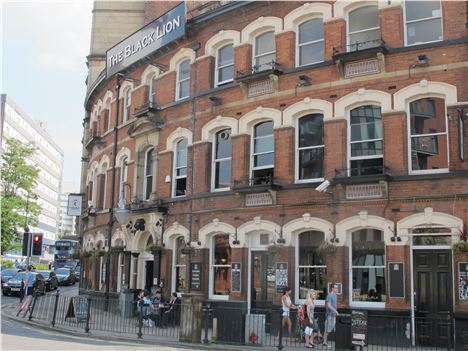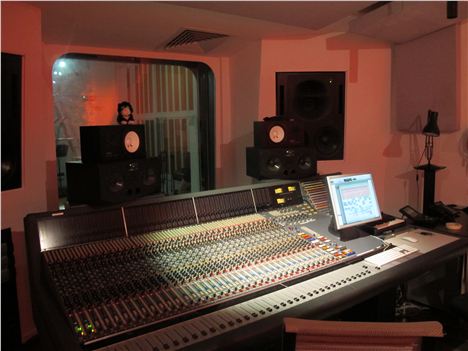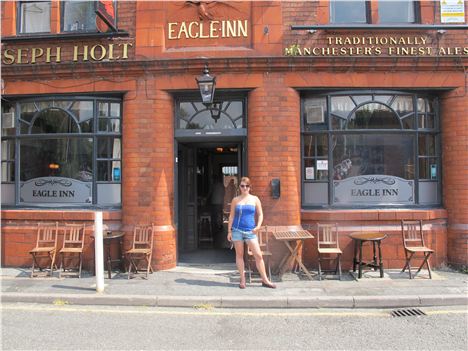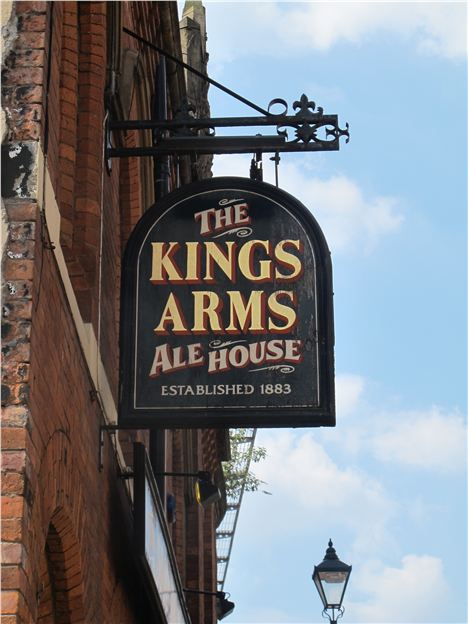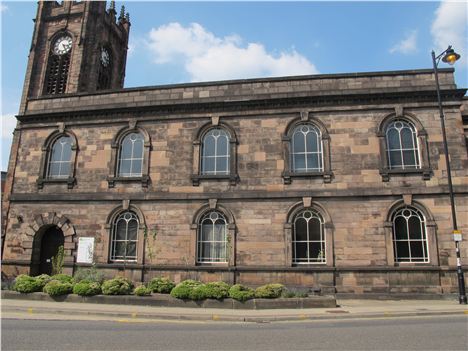SALFORD has given the world a great deal. From Albert Finney and Christopher Eccleston to Paul Scholes, from Mark E. Smith and John Cooper Clarke to Ewan MacColl’s poignant ode to industrial grime, ‘Dirty Old Town.’ However, the city has always been overshadowed by Manchester, its boisterous, better-known, big brother. To many people, Salford is perhaps nothing more than the new headquarters of the BBC and home to Smiths pilgrimage site, the Salford Lad’s Club.
If 600 year old tennis doesn’t put a spring in your racquet then you can just pop in to admire the majestic interior and the collection of trophy animal heads mounted on the walls.
But things are afoot and nowhere more so than just across the River Irwell, in what was Salford’s traditional centre until the railway cut it to shreds. Now with people returning to live, and interesting businesses and initiatives starting to kick in, the whole area is changing for the better, becoming as much a part of the regional centre as Castlefield or the Northern Quarter as this selection of Salford’s movers and shakers shows.
The Biospheric Project
Easily the strangest, least conventional entrant on the list, nevertheless the Biospheric Project is a bold, fascinating concept – it was also included in the recent Manchester International Festival.
The project is all part of an initiative to put forward a viable solution to the impending doom of ‘rising food prices, climate change and growing urban populations’, posing the question: “How can we continue to put food on our table?”
Well, firstly by taking a derelict mill (so many derelict mills knocking about) overlooking the river and transforming it into an ecological haven, part farm, part laboratory, part shop and even part research centre, with the goal of finding a sustainable solution to urban food production.
It may all sound like a hippy school science project that’s got way out of hand, but the venture is an admirable attempt at creating a lasting legacy. The old mill is now a marvel of innovative, home grown food production, ranging from practical solutions that can be tried at home to madder ideas, like encouraging bees to come round your house.
The project hopes to eventually produce enough fruit and veg to deliver to all the local restaurants as part of their on-site shop, 78 Steps, in conjunction with enterprising delivery company Whole-Box.
The Black Lion
Ideally situated on the corner of Blackfriars Road and Chapel Street, a stone’s throw from Manchester’s centre, The Black Lion is a fine place to stop off as you head into Salford.
Under the ownership of Jenny Inchbald, Thomas Chambers and head chef Rebecca Lewis-Armes, The Black Lion is set for a major overhaul from top to bottom, back to front, inside and out. The pub is hoping to bring back the sense of community that’s been diminished by “marrying together a cross section of society” as well as silencing the critics who manage to label Salford as dangerous yet boring.
Championing not only the pub’s but also Salford’s theatrical roots, Jenny boldly says, “There is more independent theatre on this strip [Chapel Street] than anywhere outside of London.” She’s probably not wrong when you consider the amount of multi-purpose pub venues that inundate the area.
Being the spiritual home of the Bard of Salford, John Cooper Clarke, the pub is obviously keen on the arts, not only in its upstairs theatre, managed by Chapel Street Studios, but also in its dining room. Combining dining and drama through ‘Flash Theatre’, a new dimension of performance has been created through seemingly organic, impulsive introductions that leave patrons wondering what’s real and what’s part of the show.
Food wise, head chef Rebecca is hoping to send customers on “a journey from your average pub grub to something quite fabulous”. The newly introduced food menu prides itself on being entirely homemade and all fashioned from scratch to put those crummy chain pubs to shame. Co-manager Jenny assures me the beer battered halloumi (£8.95) is nothing short of “crack for vegetarians”, moreish indeed.
It may be only two minutes from the hustle and bustle of Deansgate, but The Black Lion has a reassuringly peaceful ambience, aptly described by Jenny as, “A country pub in the heart of the city”.
Blueprint Studios
Hidden away with The Eagle Inn (more of which later), Blueprint Studios has quietly carved out a reputation as one of Manchester’s best recording studios. Opened in 2003, the studio was constructed from the blood, sweat and tears of trio Tim Thomas, Fred Kindt and Ian Stewart with the aim of plugging the gaping hole created by a lack of recording studios in the area.
Calling on all their musical experiences, Tim explains how the focus of the studio was always going to be about “attention to detail”, to make the best possible forum for recording. No dingy basements, disinterested staff and limited sound options. After initially dealing purely in demos out of their limited office space, things “flew by”, typified by the fact 18 months later they had rapper 50 Cent coming into record.
After sounding out everyone locally and internationally, it means that not only local acts, like near permanent residents Elbow, are using the studio but international superstars like Alicia Keys, Justin Timberlake and even Smokey Robinson are popping in while on tour.
Although Tim and the others at Blueprint are working with some of music’s biggest names, the most satisfying collaborations are with young, upcoming acts. Rather than milking these acts of their money or leaving them to their own, inexperienced devices, the people at Blueprint offer a tailored service to each new artist who comes in, regardless of their ability. Offering consultation to young bands means that they don’t waste their time if they aren’t ready to record; rather improvements and advice are given to get them up to a required standard.
On top of the personalised help from musical engineers that makes the difference between an average and a great record, the studio’s equipment is world class. The range of their musical paraphernalia and the spec of their recording rooms is the best around, which is what separates Blueprint from other studios and DIY recording. Cavernous rooms for vocals, space for five piece band needs to record at once and fully sound proofed walls are just some of the draws found at Blueprint.
Not becoming complacent with their success, Tim cryptically hints at their vision for the future as “looking to the past in order to reach the future”. With surprisingly cheap rates for their premier service, it’s amazing that the studio doesn’t have a bigger profile, but keeping out of the limelight seems to be their style as Tim kindly declines to have his picture taken for this article. He may be elusive to photograph but he does make a bloody good cuppa, that much I know.
Corridor Bar
Without a doubt the hardest place to find on this list, and probably the hardest bar to hunt down in Manchester. Corridor remains an elusive prospect for many, finding itself between El Dorado and Atlantis on the scale of places really, really tough to find. Almost completely unmarked in a back street alley location, the bar is a real find for cocktail enthusiasts in its “New York speakeasy” approach.
The exterior may be nothing more than part of an unpleasant red brick warehouse yet inside is sleek little bar, lined with blacks and crimson reds to give an intimate, and slightly sordid, ambience.
Corridor’s cocktail menu is an all-encompassing voyage of molecular mixology. Dividing the drinks into classics, twisted and signatures means that all bases are covered, whether you want a world class Martini or something lined with absinthe, there is an inexhaustible range to choose from. Open till 4am with quality drinks at a reasonable £7, coupled with the fact the usual mob of rowdy drunks will never find it, make this Manchester and Salford’s classiest late night hangout.
The Eagle Inn
Tucked away in the depths of an industrial estate which may leave you questioning whether it’s a good idea to venture to it, lies the Eagle Inn. This old-fashioned pub is worth a detour through warehouse-land.
Under the guidance of Esther Maylor, the pub is a throwback to the traditional sort of boozer that once flooded England’s towns and cities- complete with an old fashioned bar and a selection of secluded rooms in which to drink a pint of Holt’s. With no real food menu, bar the occasional BBQ, the Eagle Inn is in a prime location to escape the commotion of Manchester and enjoy beer the way it was intended. Named CAMRA’s most improved pub 2012, The Eagle Inn revels in the forgotten sense of community, so much so the pub has been likened to Cheers, the place where everybody knows your name.
Literally down the road from Blueprint Studios, this pub is a favourite haunt of the musicians passing through, and it seems to be Elbow’s preferred drinking destination. Esther tells me bands often label the pub ‘The Downfall’, due to its uncanny knack of distracting them from recording, instead leaving them indulging in the pub’s beery delights.
A musical venue is set to be added on to the pub in October and being open till very late on weekend means there is more than enough incentive to make the pilgrimage across the river. Sweetening the deal is the building opposite, which is the site of Manchester’s first ever public baths and laundry service, and if that doesn’t get your heart racing nothing will.
Islington Mill
Creative space, concert venue, bed and breakfast, art gallery and a café, there’s not much that Islington Mill doesn’t house in its grand, expansive industrial walls.
Originally spied by Bill Campbell from his adjacent flat, the derelict cotton mill (of course, another mill conversion) appeared to him as the perfect creative venue and artist space. After scrounging every available penny, he bought the imposing structure in 2001. Working from the fourth floor down, he slowly renovated each one to accommodate new functions, transforming it from its dilapidated state to one of the Manchester and Salford’s premier creative hotspots.
With no partiality for any particular art, the Mill is home to every possible kind of artist - from graphic designers to fashion designers as well as traditional painters. Most of the artists only use the creative spaces for their work but the Mill also hosts a range of resident artists who not only work, but display their finished pieces in the traditional galleries and installation spaces there.
Most recently, Manchester-based Maurice Carlin has used the Mill (well, the neighbouring warehouse) as the base for his latest collection, Performance Publishing, Regent Trading Estate. Covering the floor with hundreds of individual CMYK relief prints the 800sqft space was colourfully transformed to reimagine the original surface. The whole process was broadcast live across the world allowing for viewers to provide feedback and comments, something which in itself helped influence Carlin’s work and decisions during the month long residency.
Elsewhere Alistair McClymont and Sophie Clement collaborated on an installation labelled The Ghost in the Machine that found its home in the still dilapidated, haunting space on the fifth floor. Additionally, downstairs McClymont simply set a range of speakers to a frequency so low it’s almost beyond human hearing. While it couldn’t be heard, the vibrations could be felt, supposedly in some cases causing “feelings of fear or awe in humans”.
The creative plethora doesn’t end there as the Mill also acts as a live music venue which has featured high profile acts such as Elbow, Delphic and The Ting Tings (who formed at the Mill).
Some may deride Islington Mill as nothing more than a bohemian, hippy commune but the reality is that this relic of the Industrial Revolution is a something closer to the Tate Modern due to its dimensions and its ambition and reach. Not content on displaying the best local talent, a series of ongoing partnerships with New York’s Flux Factory and Barcelona’s La Escocesa Studios have brought international artists to Salford.
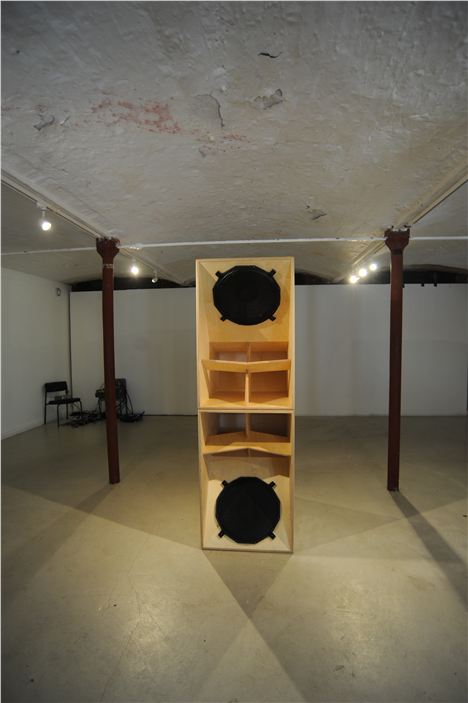 Islington Mill- Alistair McClymont ,The Ghost In The Machine
Islington Mill- Alistair McClymont ,The Ghost In The Machine
The King’s Arms
This list could be exclusively full of pubs, such is the variety and sheer quantity that populate the Salford side of the river Irwell, yet that would be boring so only a select few have made the cut.
The King’s Arms is one of Salford’s most recognised and most loved pubs, for its friendly, cosy atmosphere as well its eclectic range of events and nights. Situated just off Chapel Street, The King’s Arms is a cornerstone of Salford’s thriving arts and theatre scene, typified by the French Theatre upstairs in addition to the in house production company, Studio Salford.
Besides hosting a variety of comedy, theatre and music, the pub also doubles up as a meeting point for a bizarre range of societies, including Salford Friendly Anglers Society, the world's oldest angling club, and a 50 strong knitting group. Along with the wide-ranging mix of clientele is the even more extensive list of events the pub puts on.
From the relatively normal weekend vintage clothing fairs to the more intriguing prospects of Rapper Sword Dancing workshops and Pint Sized Operas- Opera for the discerning pub goer. These are only a smattering of the ever growing list of fascinating things on at The King’s Arms, check their website for a full list of upcoming events.
With all the extracurricular pub activities sorted, it’s a welcome relief to know they have the basics covered too with six cask ales on tap at any given time supplemented by a full food menu, including a Sunday Roast which barman Phillip assures me is excellent.
Manchester Tennis and Racquet Club
Housed in a daunting Grade II listed Victorian building on Blackfriars Road is one of England’s finest real tennis clubs.
On top of playing traditional indoor sports, squash and rackets, the club is one of the few places where real tennis can be played. Not to be confused with its mainstream cousin, lawn tennis, real tennis is historically the game of kings, hence its nicknames ‘royal tennis’ and ‘the sport of kings’ (although horse racing also gets this moniker).
Originating in the south of France out of a hand ball game known as ‘jeu de paume’, real tennis is the earliest from of traditional tennis. Played indoors with a central net, similar to lawn tennis, but the court also has a ledge running round the rim which changes the game dramatically. Fast paced shots can ping off walls and ridges allowing for endless variety of plays, a lovely man on Youtube described some shots as “killing your opponent, but doing it nicely”, wonderful.
If 600 year old tennis doesn’t put a spring in your racquet then you can just pop in to admire the majestic interior and the collection of trophy animal heads mounted on the walls.
The Mark Addy
Idyllically positioned on the scenic Salford banks of the river Irwell, “Manchester’s Original Riverside Pub” doubles up as one of the best drinking terraces around as well as splendid place to get your fill of high class pub grub.
With the menu produced by cooking maestro Robert Owen Brown, dishes are full of the imagination, charm and innovation that is often absent from pubs these days. British classics have been given an injection of panache to make truly remarkable meals. Lancashire Hotpots and roast pheasant are only two of the delights that have been given the special treatment.
The food is complimented by a smattering of cask ales on tap at all times, the pub even has its own brew, produced by Redwillow: The Mark Addy, Fearless. Challenging the tradition that wines are best served to compliment food, Brown and his beers are designed to boost the dining experience not just provide hoppy refreshment on a lovely day.
Most will agree the riverside terrace is a winning spot to idly gaze across on a sunny day, spying swans gliding, cygnets in tow, and maybe even an abandoned DFS sofa streaming down the waterway. Only a hop, skip and a jump from the glass towers of Spinningfields, The Mark Addy a prime spot to escape to for a sneaky lunchtime ale and batch of homemade pork scratchings.
The Sacred Trinity Church/ St. Phillip’s Church
On the surface, two churches no different from the thousands of others that dot England’s cities, provincial towns and hamlets. Yet looking beyond the gothic exterior of the Sacred Trinity and the grandiose tower of St. Phillip’s, are two distinctive music venues.
Under the watchful eye of Reverend Andy Salmon, these churches go beyond their religious remit to attract new audiences and rejuvenate the community.
Churches being converted into live music venues is neither new nor novel. In fact concerts have been held at Sacred Trinity since 1645 but Salford’s current contributions to the trend showcase a notable collection of new acts, making these concerts great places to say “I saw them there before everyone else started liking them”. And who doesn’t like that smug feeling?
Florence + The Machine, Marina and the Diamonds, and even Judie and the Punchbags (I made that one up) have graced the sacred stages. The combination of exciting upcoming acts in the beautiful church setting is hard to beat, making these relatively unknown venues worth a visit, if only to lord it over your mates.








